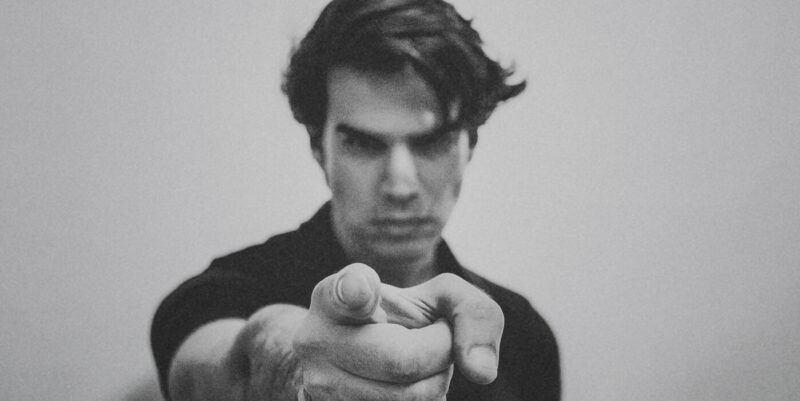Here’s how most people think about their lack of confidence:
- I’d be more confident if I hadn’t inherited my father’s indecisiveness…
- If only I didn’t have such a neurotic personality, then I could be more confident…
- If my mother had really loved me then I’d feel more confident and secure in my relationships…
Fortunately, they’re wrong.
Of course, everything from genetics to childhood experience has some influence on how confident you feel (or don’t). But by far the biggest influence on confidence is the one everyone seems to miss…
It’s your habits in the present, not the events of your past, that determine your confidence.
In my work as a psychologist, I’ve found that there are a handful of confidence-killing habits people fall into without knowing it. And it’s these habits that are the real causes of chronically low confidence.
If you can learn to identify and work through them, you’ll find that your natural levels of confidence are much higher than you realize.
1. You’re addicted to reassurance
Reassurance-seeking is like outsourcing emotional labor onto other people. And not only does it kill your confidence, it also tends to sabotage your relationships and lead to people becoming resentful of you.
Here’s a small example:
- You get an email from your manager saying they want to talk to you in their office first thing tomorrow morning.
- You immediately imagine the worst (I”m going to get fired!) and feel incredibly anxious.
- So you turn to your spouse and say: Oh my God, this can’t be good. I’m freaking out here. What should I do?
- Your spouse patiently listens, validates your fear, and walks you through all sorts of reasons why it’s unlikely.
- After 15 minutes of being talked down, you feel noticeably less anxious and reassured.
Here’s the first problem:
Avoiding painful feelings always makes them worse in the end.
When you immediately run away from your emotional difficulties and hand them off to someone else, you’re teaching your brain that you’re afraid of feeling bad and can’t handle it on your own. This means the next time you feel afraid you’re going to feel doubly afraid and not confident to deal with it.
Then there’s the second problem:
When you use other people to feel better, they end up feeling used by you.
And when someone important to you like a spouse or best friend feels like you’re using them, they’re going to get resentful even if they don’t say so directly.
Your fears and insecurities are your own. And you alone are responsible for managing them in a healthy way. So for the sake of your self-confidence and the quality of your relationships, break the habit of relying on other people to feel good.
Learn More: How to Validate Your Emotions in 3 Simple Steps
2. You second-guess yourself constantly
Each time you second-guess yourself, it’s a tiny message to your brain that you don’t believe in yourself. So if you only do it occasionally, no big deal. But if you’re in the habit of constantly second-guessing yourself, think about what you’re teaching your brain?
If every time a big decision arrives your immediate reaction is to tell your brain you’re not capable of making big decisions, how confident can you expect to feel the next time a big decision comes around?
Look, it’s obviously important to be thoughtful before making decisions—especially big ones with major consequences and lots of uncertainty.
But it’s also important to accept that you will never eliminate uncertainty entirely. This means there will always be a chance you make the wrong decision and bad things happen.
The heart of second-guessing is the unwillingness to accept the fundamental uncertainty of life.
Put another way, chronic second-guessing is a form of perfectionism where you feel like no matter how hard you work, the result is never good enough because it’s not perfect—because you don’t know for sure that it’s the right decision.
If you want to feel more confident, you need to make your peace with uncertainty and accept the responsibility of making decisions and living with the consequences.
Learn More: How to Be Decisive: 4 Strategies for Confident Decision-Making
3. You catastrophize about future danger
Catastrophizing is an extreme form of worry where you quickly start thinking about all the worst case scenarios…
- Oh my God, she’s going to leave me, I know it.
- Great, I’m going to get fired for this. How will I be able to make rent? What if I end up homeless?
- I should never have said that… He probably thinks I’m a total ass.
Of course, catastrophizing is something we all do occasionally. And for good reason: the ability to imagine the worst case scenario can be a very good thing in the appropriate time and place.
Thankfully, many of us rarely face true worst case scenarios.
But if you’re in the habit of always catastrophizing, not only will it chip away at your confidence in your ability to handle difficulties in the future—it’s also going to make you incredibly anxious and stressed out all the time.
If you’re constantly telling yourself the world is ending, you’re going to constantly feel like the world is ending.
And it’s awfully hard to feel confident when you’re always worried that disaster is right around the corner.
Learn More: Helpful Tools and Resources for Anxiety and Worry
4. You dwell on past mistakes
Just like it’s hard to feel confident if you’re always predicting that disaster is about to strike, it’s similarly hard to feel confident if you’re constantly reminding yourself of your mistakes and failings.
For example:
- Every time someone gives you feedback at work, you replay that terrible scene from 10 years ago when you made that stupid error and were humiliated in front of the whole company.
- Every time a memory of your deceased parent comes to mind, you mentally rehearse all the things you wish you had told them before they died and how shameful it was that you didn’t do it while you had the chance.
- Every time you and your partner have a fight, you start thinking back on all the previous relationships you’ve sabotaged because you couldn’t handle your anger well.
Healthy reflection is a good and normal thing. Which means some degree of thinking back on your mistakes in an attempt to learn from them is very useful—even confidence-boosting!
But if you’re habitually reminding yourself of past mistakes well past the point of new learning, it’s all side effect and no benefit. You’re keeping your shame and insecurity high and your confidence and self-worth low.
It’s hard to feel confident about the future when you won’t let go of the past.
The trick is that you have to be willing to live with the fact that the past is unchangeable, which means you are truly helpless to change it.
More often than not, incessant rumination about the past is a sign that you haven’t really confronted that helplessness and learned to live with it. And your low confidence is an unfortunate causality of that denial.
Learn More: How to Stop Ruminating and Finally Let Go
5. You’re afraid of feeling afraid
The American President Franklin Roosevelt famously said:
The only thing we have to fear is fear itself.
And while his political and economic policies aren’t something I’m qualified to comment on, as a statement of human psychology, that quote is pretty right on the mark.
Because here’s the thing:
The fear that keeps your confidence low doesn’t come from the thing itself, but from the feelings about it.
For example:
- Suppose you’re afraid and lacking confidence before a talk you have to give in front of 15-20 people.
- The real obstacle to you going up on stage and delivering the speech isn’t the idea that people will hate the talk. Or that you’ll suddenly forget everything you’re supposed to say.
- The issue here is the feeling of fear itself and everything that goes with it: your mind buzzing with worries and catastrophizing visions, adrenaline surging through your veins leading to rapid breathing and elevated heart rate, negative self-talk telling you this was a dumb idea and that you’ll never people able to do it, etc.
This is why so many bridesmaids and groomsmen have a little too much to drink before giving speeches and toasts at weddings: Alcohol doesn’t make you more articulate or make it more likely that your punchline lands with the audience. Alcohol makes you feel confident because it gets rid of your fear and inhibitions and lets your natural confidence shine through (at the right dosage, anyway 🙂
In any situation where you lack confidence and feel afraid, there’s a good chance the real obstacle is your relationship with fear itself.
Feeling afraid is hard enough without feeling afraid of feeling afraid.
If you want to feel more confident, start to cultivate a healthier relationship with your fear. Start acknowledging it and validating it instead of trying to avoid it.
Remember:
Confident people don’t escape fear. They master it.
Learn More: 4 Myths About Anxiety Everybody Believes
All You Need to Know
If you want to feel more confident, work to identify and eliminate these confidence-killing habits:
- Reassurance-seeking
- Second-guessing yourself
- Catastrophizing the future
- Dwelling on the past
- Avoiding fear




